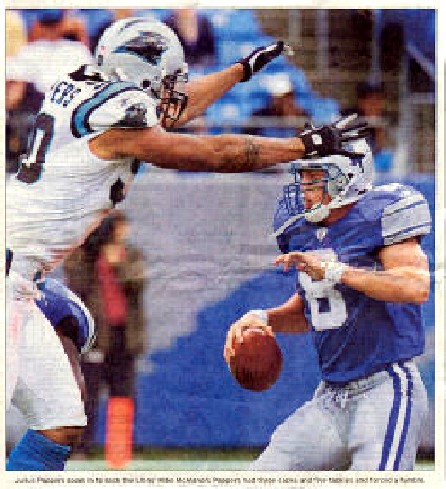
Julius Peppers
Carolina Panthers
Defensive End
Pro-Bowl Starter in 2008
Pro-Bowl Starter in 2006
Pro-Bowl Starter in 2005
Pro-Bowl Starter in 2004
Defensive Rookie of the Year in the NFL, 2002
First Round NFL Draft Choice
(second overall)
in 2002
University of North Carolina at Chapel Hill
Afro-American Studies Major
Lettered in Both Basketball and Football at UNC
Birthdate: 1/18/1980
Julius Peppers signed a 7-year contract with the Carolina Panthers in July 2002. He received a signing bonus divided into $9.1 million in 2002 and $4.05 million in 2003. His first-year base salary will be $3 million, but will drop to $350,000 in 2003. In the following five years, the base salary will rise by $250,000 per year. His contract includes escalator clauses worth $11 million if Peppers is chosen to participate in the Pro Bowl in each of the seven years. Other incentive clauses raise the total value of the contract to about $50 million over the seven years, with the possibility of as much as $62 million if all incentive and escalator clauses are met.
Peppers was eligible for unrestricted free agency in 2009. To avoid losing him, the Panthers named him as their "franchise" player. He then had two options: accepting a one-year offer from the Panthers, or seeking out an offer from another team to which the Panthers would agree to trade him. He spoke repeatedly during this time of his desire to play for another team.
On 24 June, Peppers signed a one-year contract with the Panthers. He has a guaranteed $16.683 million salary, plus an incentive of $1.5 million if he makes the Pro Bowl and $250,000 for each playoff win up to and including the Super Bowl. This contract makes him one of the most highly paid players (and perhaps the highest paid player) in the NFL.
In the 2008 season, Peppers returned to stellar form. He had 14.5 sacks on the year, a personal best, and 51 tackles in total. The Panthers advanced to the divisional playoffs but lost to the Arizona Cardinals.
The 2007 season was poor by Peppers' standards. He had 38 tackles and only 2.5 sacks. The team ended with more losses than wins, and did not go into the playoffs.
The 2005 and 2006 seasons were Pro-Bowl years for Peppers. In 2005 he had 50 tackles and 10.5 sacks, while in 2006 he had 57 tackles and 13 sacks. The Panthers did not advance to post-season play in 2006, ending with an 8-8 record, but in 2005 they had an 11-5 record and earned a wild-card spot in the playoffs. They advanced to the conference finals.
Peppers had a season of highlights in 2004 so impressive that it led Len Pasquarelli of ESPN to call him "scary good". He scored 3 touchdowns -- two on interceptions and one on a fumble recovery against Atlanta that topped the highlight clips for weeks. In addition to these, he had his usual stand-out year: 11 sacks, 85 tackles and four forced fumbles. He was named to the Pro Bowl for the first time, and was a consensus first-team All-Pro selection. The Panthers were not "scary good" that year, ending with a 7-9 record.
In the 2003 season, he started all 16 regular-season games and all four post-season games. He led team with 32 quarterback hurries and ranked second with seven sacks. He was a member of the defensive line that ranked second in the NFL with 32.5 sacks.
In 2002, he was a starter in all 12 games he played. He led the Panthers and ranked second among NFL rookies with 12 sacks in addition to producing 54 tackles, one interception, five forced fumbles, 19 quarterback hurries and four batted passes. He was suspended for the final four games of the season by the NFL for violating the banned substance policy. He was named NFL Defensive Rookie of the Year by The Associated Press, Sports Illustrated, Pro Football Weekly and Football Digest, and was chosen to the all-rookie team by Pro Football Weekly.
Peppers was a draft choice of the Panthers in 2002. He left the University of North Carolina following his junior year. At the end of that year he won the Lombardi Award, given to the nation's top lineman, and the Chuck Bednarik Award, given to the nation's best overall defensive player.
In three seasons with the Tar Heels he recorded 30.5 sacks and 53 stops behind the line of scrimmage. This places him second on the All-Time Record for sacks.
Julius played basketball for the Tar Heels in 1999 and 2000, helping the team reach the Final Four his sophomore year.
He was a Parade All-America and named Male Athlete of the Year by the North Carolina High School Athletic Association following his senior year at Southern Nash HS in Bailey, NC. He played tailback and defensive end in high-school football and also lettered in basketball and track.